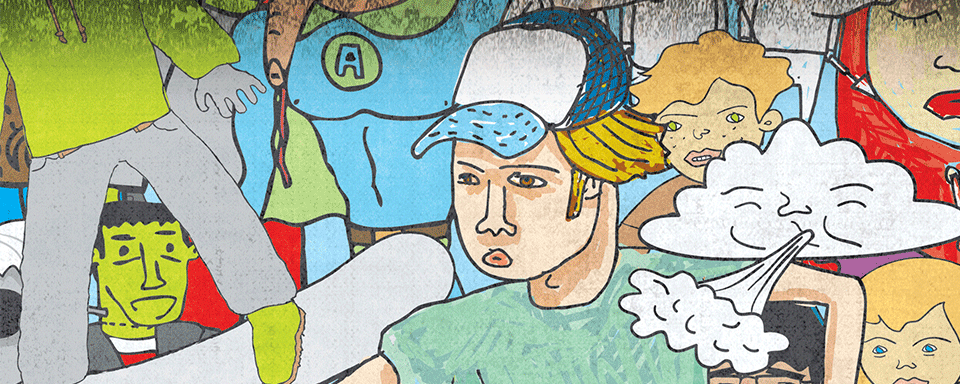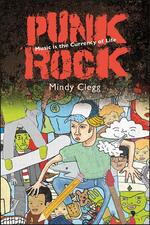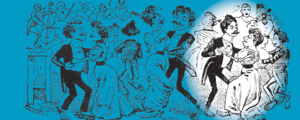
What Author is #NextUP at SUNY Press?
Richard Carlin is a Senior Acquisitions Editor with SUNY Press
Mindy Clegg is an Instructor at Georgia Perimeter College and has written for academic journals, zines, and blogs on punk rock, 20th century history, and popular culture. Her first book was recently published by SUNY Press, Punk Rock: Music is the Currency of Life. Mindy’s editor, Richard Carlin, spoke recently with her about her experiences writing for a university press and also how she came to develop her unique take on punk music and culture.
RC: How did you come to be interested in punk rock?
MC: When I was an undergrad, I took a course in Balkan history and one of the things I was interested in was what’s the pop culture like in Yugoslavia? I wondered, “Do they have a punk scene there?” Turns out they had a really amazing punk scene. That topic ended up being the basis of my master’s thesis and part of it made it into my dissertation, which is more about the Cold War experience. I was really curious what the Cold War specifically meant for Punk Rock. The conclusion I came to was that the U.S.’s promotion of popular culture opened the gateways to what I call “trans-local” connections to be made. Punk is a perfect example of that because all of its activity is very localized: You want to build this scene, you want to support the bands that are there, and build institutions: labels, clubs, those sorts of things. But it’s also an international community, so you’re also listening to bands from other places, especially the U.S. and the U.K. It’s local, but it’s also trans-national.
RC: It’s pretty unusual to take a course on the Balkans and think, “Was there punk rock in Yugoslavia.” You must have been a punk rock fan to begin with, or exposed to it. What made you make that connection?
MC: I was really more into punk-adjacent things, like post-punk, industrial, and gothic music. I spent a lot of time on the Atlanta goth scene, I had friends who were into goth. Overall, I think that punk rock is the progenitor of the post-‘60s counterculture. It’s certainly following along from it, but there was an attempt to bring in some new energy into the counterculture. A lot of the early punks thought that the ‘60s counterculture kind of failed, that they sold out. I think by the early ‘80s, punk had gone from this marginal subculture that had connections to the mainstream music industry to become a counterculture. And I was really interested in how punk influences all of these other musical cultures that came out of it. Lots of the post-punk bands were absolutely influenced by going to see the Sex Pistols; Joy Division was famously, they saw them in Manchester and they immediately went out and formed this amazing band. Punk seemed to be the root of something, to push people toward being more experimental and to try new things. I’ve always been interested in “Where did something start? What are the roots of things?” So, the deeper I can dig, the happier I am. You can see that in the book, actually. The first chapter doesn’t even cover punk, it covers the early modern period to the rise of the teenager, as Jon Savage put it.
RC: One thing that stood out to me about your manuscript was the way you view punk music expansively, not only as a trans-national phenomenon but well beyond just talking about the music. You really break it wide open and make a lot of connections. How did you come to make that leap?
MC: It has a lot to do with my training. For my masters I worked with Michelle Brattain who studies race and labor. And I think in some sense that punk is a labor story, in that it is people trying to create these alternative institutions. She ingrained in me this idea of pushing for interconnections. As a Ph.D. candidate, I worked with Alex Cummings. She had studied the connection between the music industry and copyright, specifically through the lens of piracy. In this research, she brought together all these things you don’t really think about: How does copyright law change when you have an industry that’s trying to stamp out something that they see as a threat? I really like Smoking Typewriters, John McMillian’s book on alternative journals of the ‘60s. Montgomery Wolf was also on my dissertation committee and is another punk historian. And I also have to put in a plug for the late Denis Gainty. His work was more on the body, but the thing he was working on when he passed away was a history of bluegrass in Japan. All these great folks really got me thinking about how you could find these unusual connections that you wouldn’t expect.
RC: Japanese bluegrass musicians are like a carbon copy of American bluegrass; they try to reproduce the exact look and sound of the classic bluegrass bands. However, international punk bands, while influenced by the U.S. and U.K. groups, are very much based in their local communities and create their own unique sounds. Do you think there is something about punk music that makes this happen?
MC: I don’t think it’s just unique to punk; you can see it in hip hop, too, especially early hip hop. It’s pushing for experimentation with sound and with words. I think maybe it’s something bigger about the 1970s. In the ‘70s, people were really pushing against the mainstream structures. There is this absolute lack of faith in our institutions, because of things like Watergate. In the early ‘70s, anything that was telling people how they’re supposed to be doing things, they’re kind of looking askance at it. They’re starting to say, “Well, is that the only way we can do this thing?” I think it was partially the anti-institutionalism of the time, but also early punk is especially experimental; it’s a lot more queer than people give it credit for, it’s not as white as you see when you get to the hardcore in the 1980s. So people are injecting cultures that have been marginalized into this whole thing. I think that is a lot of it, too.
RC: Turning to your own writing career, you’ve written for blogs and zines, for the “alternative” press broadly speaking, and you’ve written for academic journals and now for a university press. What are some of the differences between these different outlets and how do you feel each has affected your writing?
MC: I think writing for blogs is a straightforward thing. You’re usually writing an article-length piece. You have a lot more autonomy about what you’re going to write about. I’ve written for Tropics of Meadows, a great history blog. I wrote a whole series of articles about the Phantasm movies, Don Coscarelli directed them. They’re a whole series of low-budget horror films, and I wrote about how this story is about the deindustrialization of the American heartland. Blogs can be places where you can really experiment and think through new ideas. Another one I did was an article for an edited volume about Dr. Who and the Cold War, and why Dr. Who got bigger here more recently. That was more like an academic article. It went through a review process. I really welcome having outside readers look at my work; you can’t be perfect, so it’s helpful to get other insights and suggestions on how to improve your writing.
I liked working with a university press a lot. You guys were really supportive of what I wanted to do, and helpful in helping me navigate through this new process. I had never done something like this before. This was a pretty easy process to wrap my head around. I also appreciated the help in promoting the book. I didn’t have the same connections or knowledge that your marketing people did. I appreciated that you sent out the book to all the places that I recommended. It’s too soon to see many reviews, but I’m hopeful that readers beyond the academic audience will enjoy this book.
RC: Do you think publishing with a university press is going to help advance your academic career?
MC: I hope so. I’m one of those new academics who is just grinding away here, hoping to find a full-time, tenure-track position. I’ve gotten a lot of support from my colleagues for my book and it certainly will help to add it to my CV, and eventually translate into my obtaining a full-time, permanent position. There are a lot of people out there like me; there aren’t that many full-time positions, so it’s tough.
RC: Your book was not based on your dissertation, which is unusual; it was a general interest book covering punk rock as a phenomenon. Would you recommend to other young scholars to write about topics beyond just their dissertation and work with a university press in that way?
MC: I would absolutely recommend that. You spend so much time on your dissertation and it’s so stressful that actually you’d probably do well to step away from it for a while and do something else. Something like this, a general history book, there’s not a ton of research that needed to be done for this in terms of going to archives and things like that. So doing a project like this is great for a first-time author because it can get you out of your head space and give you an idea of what the broader topic is going to look like. This gave me a sense of some of the broader areas of punk that I could write about, but it also could be helpful to you in recontextualizing your dissertation. So I would absolutely recommend thinking about something else, maybe related to your dissertation or maybe something completely different. Anything that helps you step away from something you’ve been working on for five, ten years is certainly helpful.


